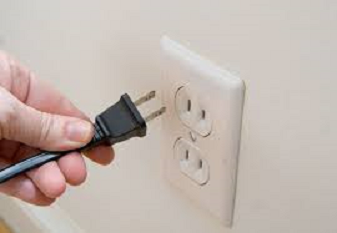Unplug and Breathe

The coronavirus pandemic has forced most of us online to a greater degree than ever before. Many of our team members are working remotely, or have been, we hold client and staff meetings via Zoom and the new Microsoft application Teams. Our children, from kindergarten through post-graduate studies, have been schooled online; for many, this is an open-ended situation.
This increased online presence allows us to peruse more frequently the news about the COVID pandemic, the regulatory mandates, the economic and emotional impacts on our communities. Often anxiously, and sometimes obsessively.
Now, current events are becoming more fraught, more anxious-making to many of us, than ever. As good citizens, we need to be informed, certainly. Unfortunately, too many people have been affected by anxiety and depression this year – and money worries have been shown to be a leading cause of feelings of uneasiness.
A study conducted by the Centers for Disease Control and Prevention in late June 2020 was published Thursday, August 13, 2020, in the journal Morbidity and Mortality Weekly. The report shows anxiety and depression skyrocketing amid the COVID-19 pandemic, noting that the percentage of Americans reporting symptoms of anxiety disorder has increased about threefold, and the percentage reporting symptoms of depressive disorder about fourfold, compared with levels seen in a survey conducted around the same period in 2019.
Is it possible that by unplugging we could help ourselves?
Because anxiety is anathema to focus. And you know I’m a believer in focus. Deep focus. More calm, leading to greater focus, in both our working and non-working lives can bring enormous benefits.
But, how do we unplug when we aren’t at work, yet not completely isolate ourselves from others? How much is too much? How much is too little? That is for each individual to determine. Some people can completely unplug quite happily, while others may want to stay more connected.
We can be choosy about our sources of information, and read articles or websites we think are likely to be both informative and uninflammatory.
We can connect with friends and family who uplift us.
One way we might reduce anxiety and stress could be to create a boundary around our evenings, and make them as much as possible an unwinding-time. Let’s breathe deeply, and give ourselves permission – no, empower ourselves – not to be anxious and stressed. And to take charge of our time, spending it on what we truly value.
We can allow ourselves to be content. Remember that in relationships, it’s good to play deaf occasionally, and let things pass without comment. Not everything has to be a battle.
Then, let’s shut off our computers, put our phones and tablets aside, and enjoy our evenings offline. We can watch a new film – or an old favorite – with family or alone, depending on our households. We can listen to music, read a book. Work on assembling a puzzle (this is a new family favorite in my house).
You may find you sleep better, and perhaps wake better, too. I know I do – on both counts, when I am mindful and remember to unplug and enjoy my family – in person, in real time.
How do you unplug – what are your strategies, what activities do you replace net-surfing and news-surfing with?
Please click here to email me directly – I would love to hear your stories – and maybe get a few tips!
Until next Wednesday –
Peace,
Eric
